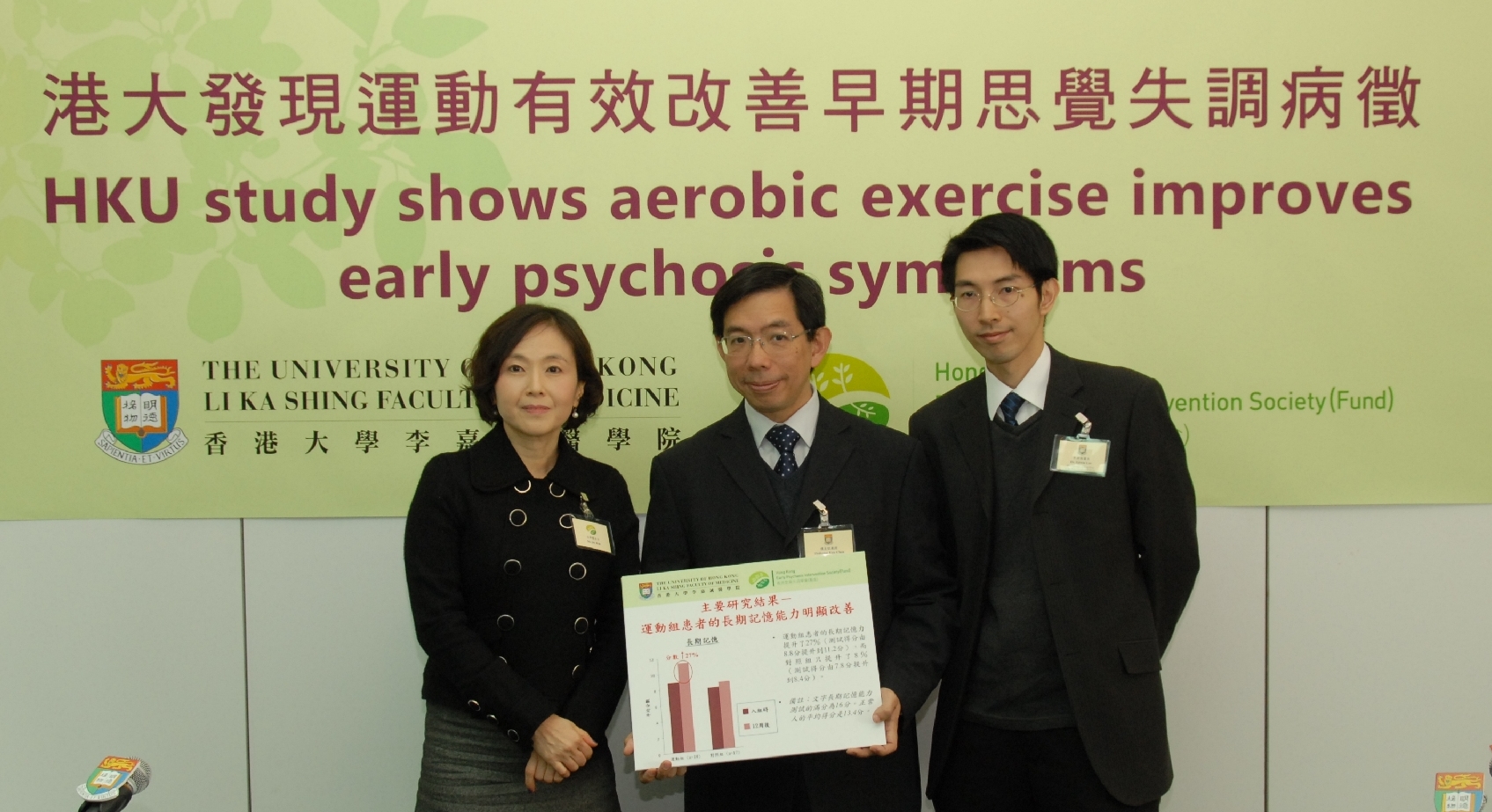Media
HKU study reveals aerobic exercise holds promise for improving memory and learning in psychosis Researchers to jointly launch the FitMind Movement with Hong Kong Early Psychosis Intervention Society (EPISO)
04 Jan 2012
Psychotic disorders cause many dysfunctions including neurocognitive impairment (e.g. memory and attention), low motivation and social isolation. Medication controls psychotic symptoms (e.g. delusions and hallucinations) but is less effective in treating these associated dysfunctions, which have widespread consequences in the patient's daily functioning and long-term outcome.
Researchers at The University of Hong Kong Li Ka Shing Faculty of Medicine are conducting a study to investigate the potential of add-on physical exercise intervention as a non-invasive cognitive remediation therapy in patients with psychosis. Results show improvements in neurocognitive functions with 12 weeks of aerobic exercise. The study is the first worldwide to be done in patients with early psychosis.
"The preliminary data demonstrated that aerobic exercise can reverse some cognitive deficits even in the early stage of psychosis. The relations between aerobic exercise and cognitive improvement may be mediated by neural plasticity in the brain. In collaboration with the Hong Kong Early Psychosis Intervention Society, we developed a series of exercise named FitMind movements which is designed according to the specific needs and ability of psychosis patients. We will have a series of programmes in the coming months for psychosis patients and general public to increase their awareness of the importance of exercise," commented Professor Eric CHEN Yu-hai, Clinical Professor, Department of Psychiatry, The University of Hong Kong Li Ka Shing Faculty of Medicine and also the principal investigator of the study.
Rationale and Methodology
HKU Researchers started the recruitment of subjects in July, 2010 and 35 psychosis patients had completed the study. The patients were randomised into receiving either a 12-week exercise intervention added on to their current treatment or continuing with their current treatment until after 12 weeks. Their neurocognitive functions and other clinical and biological parameters were measured before and after the 12-week study period for group comparison.
During the 12-week period, patients receiving exercise intervention underwent 3 sessions of aerobic exercise training per week, with each session lasting 40 to 50 minutes (36 sessions in total). The training includes walking on a treadmill for 15 to 20 minutes, plus stationary cycling for 25 to 30 minutes. Their heart rate was continuously monitored to achieve a moderate level of exercise exertion intensity.
Major Findings
Using the "verbal acquisition" and "long-term memory" trials of the Hong Kong List Learning Test, the patients' ability in learning and long-term memory was assessed respectively before and after the exercise intervention.
Early results of the study suggest that verbal acquisition and long-term memory in the patients who received exercise training are significantly improved, compared with the control group. Patients in the exercise group had a 26% increase (from 23.8 to 30.0 scores) in mean score in the learning test and a 27% increase in mean scores in the memory test (from 8.8 to 11.2 scores), compared with only 6% (25.2 to 26.6) and 8% (7.8 to 8.4) in the control group. (Note: The respective mean scores in healthy individuals in the learning and memory trials are 36.0 and 13.4. )
FitMind Movement
Though the study shows clearly the benefits of exercise in early psychosis patents, extra barriers to exercising exist in the patients, such as the lack of resources access, social and other support, as well as reduced interest and motivation as a result of the illness.
To facilitate the promotion of physical exercise among patients and their healthy counterparts, the Hong Kong Early Psychosis Intervention Society (EPISO) is launching the FitMind programme in collaboration with the Department of Psychiatry, The University of Hong Kong Li Ka Shing Faculty of Medicine. Based on the present study, a comprehensive exercise programme is being developed, tailoring to the specific needs and ability of patients with psychosis. An exercise coaching system with trained community peers is being organized as a support network. A series of publicity campaign, including a charity walkathon to be held on March 18, 2012 and a series of 10 easy-to-follow movements has been produced to promote exercising and motivating patients with early psychosis.
About Hong Kong Early Psychosis Intervention Society (EPISO)
The Hong Kong Early Psychosis Intervention Society was founded in 2007 and registered as a charitable institution in 2009. EPISO consists of experienced professionals, academics (including doctors and professors from HKU Li Ka Shing Faculty of Medicine) and lay members in the field of early psychosis. The society aims to make accessible knowledge and experience gained from research and clinical practice to promote high-quality early psychosis intervention services, professional training, and public awareness programmes.
About Psychosis
Psychosis affects up to 2 in 100 people and is a leading cause of disability worldwide. It refers to a set of symptoms that include hallucinations, delusions, and disorganized thoughts and speech. It is a psychological and physiological condition related to an imbalance in certain chemicals in the brain called ‘neurotransmitters'. Multiple aspects of a person's life can be affected by this condition, including subjective experience, wellbeing, motivation, contact with reality, and functioning. Symptoms can usually be effectively controlled by medications but more extensive psychosocial intervention is required to assure optimal outcome.


